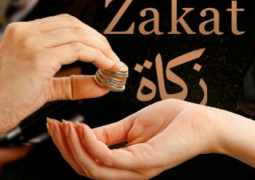
This
prevents dirt from getting on one’s penis, and also makes it easy to keep it
clean. For women, it involves cutting the outer portion of the clitoris. Abu
Hurairah reported that the Messenger of Allah said, “Ibrahim circumcised
himself after he was eighty years old.” (Related by al-Bukhari.) Many scholars
say that it is obligatory. The Shaf’iyyah maintain that it should be done on
the seventh day. Says ashShaukani, “There is nothing that states explicitly its
time or indicates that it is obligatory.”
Shaving
pubic hairs and pulling out underarm hairs
They
are two sunan acts. If the hair is only trimmed or pulled out, it will suffice.
Clipping
one’s fingernails, trimming and shaving his moustache
Ibn
‘Umar related that the Messenger of Allah said, “Differ from the polytheists:
let your beards (grow)” and shave your moustache.” (Related by al-Bukhari and
Muslim). Abu Hurairah reported that the Messenger of Allah, upon whom be peace,
said, “Five things are part of one’s fitra: Shaving the pubic hairs,
circumcision, trimming the moustache, removing the hair under the arms and
trimming the nails.” (Related by “the group.”) It does not mention which one
would specifically fulfill the sunnah. One should make sure that his moustache
is not so long that food particles, drink and dirt accumulate in it. Zaid ibn
Arqam related that the Prophet, upon whom be peace, said “Whoever does not take
(off) some of his moustache is not one of us.” (Related by Ahmad, an-Nasa’i and
at-Tirmizhi, who classified it as sahih.) It is preferred to cut the pubic
hairs, pluck out the underarm hairs, cut the nails and trim the moustache on a
weekly basis, a practice which is most hygenic.
If some unnecessary hair is left on the body
for a longer period of time, it may disturb the person. One may leave this
action for forty days, but no longer. Said Anas, “The time period for us to
trim the moustache, cut the nails, pluck out the underarm hairs and cut the
pubic hairs was forty nights.” (Related by Ahmad, Abu Dawud and others).
Letting
one’s beard grow and become thick
This
is a feature of dignity. It should not be cut so short that it appears like a
shaved beard, nor should it be left so long that it becomes untidy. It is also
a sign of manhood. Says al-Bukhari, “Whenever Ibn ‘Umar made the hajj or
‘umrah, he would hold his beard in his fist and, whatever exceeded his fist, he
would cut off.”
Oiling
and combing one’s hair
Abu
Hurairah reported the Prophet, upon whom be peace, as saying, “Whoever has hair
should honor it.” (Related by Abu Dawud.)
Said
‘Ata ibn Yasar, “A man came to the Prophet with unkempt hair and an untidy
beard. The Prophet pointed to him, as if ordering him to straighten his hair
and beard. He did so and returned. Thereupon the Prophet observed, ‘Is that not
better than one of you coming with his hair unkempt, as if he were a devil?”’
(Related by Malik.)
Abu
Qatadah related that he had a great amount of hair. He asked the Prophet, “O
Messenger of Allah, I have lots of hair. Should I comb it?” He answered, “Yes
... and honor it.” Abu Qatadah used to oil it twice a day due to the Prophet’s
words, “... and honor it.”
Cutting
one’s hair off is permissible, and so is letting it grow if one honors it. Ibn
‘Umar narrated that the Prophet, upon whom be peace, said, “Shave it all or
leave it all.” (Related by Ahmad, Muslim, Abu Dawud and an-Nasa’i). To shave
part of it and leave part of it is greatly disliked. Nafa’ related from Ibn
‘Umar that the Messenger of Allah prohibited qiza’. Nafa’ asked, “What is qiza’
?” He said, “It is to shave off part of the hair of a youth and to leave part.”
(AlBukhari and Muslim.)
Leaving
grey hairs in place
This
applies to both men and women. ‘Amr ibn Shu’aib related on the authority of his
father from his grandfather that the Prophet said, “Do not pluck the grey hairs
as they are a Muslim’s light. Never a Muslim grows grey in Islam except that
Allah writes for him, due to that, a good deed. And he raises him a degree. And
he erases for him, due to that, one of his sins.” (Related by Ahmad, Abu Dawud,
atTirmizhi, an-Nasa’i and Ibn Majah.) And Anas said, “We used to hate that a
man should pluck out his white hairs from his head or beard.” (Related by
Muslim. )
Changing
the color of grey hair by using henna, red dye, yellow dye, and so on
Abu
Hurairah reported that the Prophet, upon whom be peace, said, “The Jews and
Christians do not dye, so differ from them.” (Related by “the group.”) Abu
Zharr reported that the Messenger of Allah said, “The best thing that one can
use to change the color of grey hairs is henna and katm (a reddish dye).”
(Related by “the five.”)
There
are some narrations that state that dying is disliked, but it is obvious that
these narrations conflict with the sunnah and custom. It is related from some
of the companions that it is better not to dye, while others say it is better
to do it. Some used a yellow dye, while others used henna or katm. Others used
saffron, and a group of them used a black dye. Ibn Hajr mentioned in Fath al-Bari
that azZuhri said, “We used black dye if our face was youthful, but if wrinkles
were present and the teeth were gone we would not use it.” Said Jabir, “Abu
Quhafah (Abu Bakr’s father) was brought to the Prophet during the conquest of
Makkah while his head was “white.” The Prophet, upon whom be peace, said, “Take
him to one of his wives and let her change the color of his hair with
something, but she should avoid (making his hair) black.” (Related by “the
group,” except for al-Bukhari and at-Tirmizhi). This dealt with a certain
incident, and cannot be generalized. Furthermore, black would not be proper for
someone as old as Abu Quhafah.
To
use musk and other types of perfume
These
are pleasing to the soul and beautify the atmosphere. Anas reported the Messenger
of Allah as saying, “Among the things of this world, I love women and perfume,
and the coolness of my eyes is prayer.” (Related by Ahmad and an-Nasa’i.) Abu
Hurairah reported that the Messenger of Allah said, “If someone offers perfume,
do not reject it, for it is light to carry and has a sweet scent.” (Related by
Muslim, an-Nasa’i and Abu Dawud.) Abu Sa’eed reported that the Prophet said
about musk, “It is the best of perfumes.” (Related by “the group,” except for
al-Bukhari and Ibn Majah).
Nafa’
narrated that Ibn ‘Umar used to burn and inhale a branch called aluwah that has
a nice smell. He also used camphor. He used to say, “This is the way the
Messenger of Allah inhaled such scents (that is, by burning them.)” (Related by
Muslim and an-Nasa’i.)
To be continued
Read Other Articles In Article (Archive)
Depositors told to withdraw savings from Oceanic Bank
Jan 5, 2011, 11:30 AM



